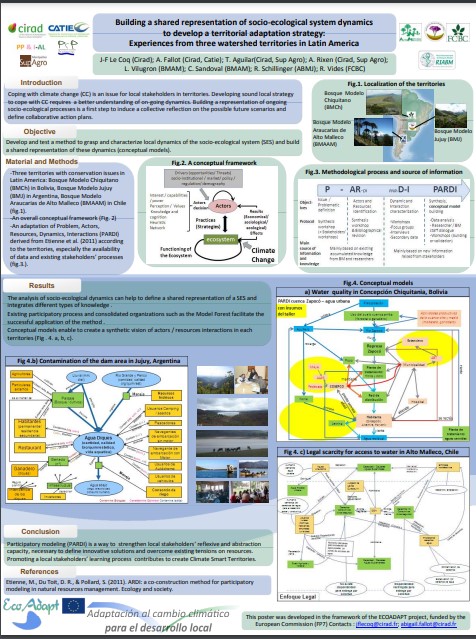Building a shared representation of socio-ecological system dynamics to develop territorial adaptation strategy: Experiences from three watershed territories in Latin America
Bosque Modelo:
Formoseño
Temática:
Cambio climático
Tipo de documento:
Documento de congreso
Resumen
Coping with climate change (CC) is an issue for local stakeholders in territories. The Ibero American Model Forest Network (RIABM) addressed this issue proposing an investigation - action project, EcoAdapt, implemented by nine organizations: Model Forests and research institutes. Developing sound local strategy to cope with CC requires a reflection rooted in the local context taking into account existing tensions on natural management. Therefore it implies to identify key challenges, and to represent ongoing processes and their interrelations. Considering territories as Socio-Ecological Systems (SES), we articulated the PARDI method (Problem, Actors Resources Dynamics Interactions) and resilience concept to characterize local dynamics of SES and build conceptual models according to key problems identified by the local stakeholders. This poster presents this methodological development, its implementation, adaptation according to availability of data and existing stakeholders' processes, and results in 3 Model Forests territories, namely in Jujuy, Argentina, Alto Malleco, Chile and Chiquitania, Bolivia. We show that the analysis of socio-ecological dynamics can help to develop a shared representation of a SES and integrates different knowledge (local stakeholders and research). The presence of existing participatory process and consolidated organizations such as the Model Forest facilitates successful application of the methods. This method enables to construct a synthetic vision of interaction between society and resources, and to shed light on actors / resources interactions in a systematic and organized way that permits a further development of Agent Base Models and the exploration of possible future scenarios. The application of tools such as PARDI enables the local stakeholders to develop a reflexive and abstraction capacity, which is necessary to develop innovative solutions and overcome existing tensions on resources. This learning process is a step towards Climate Smart Territories (CST
Información Bibliográfica
Autor:
Jean-François Le Coq, Abigaïl Fallot, Maria-Teresa Aguilar, Annabel Rixen, Lorena Vilugron, Claudio Sandoval, Ralf Schillinger, Roberto Vides-Almonacid
Año:
2013
N°:
-
País :
Argentina
Páginas:
-
Edición:
-
Idioma:
Ingles
Palabras claves
Adaptación Cambio Climático, Resiliencia, Recursos, Participación de las partes interesadas, Modelización participativa, Territorios, Bosque Modelo





